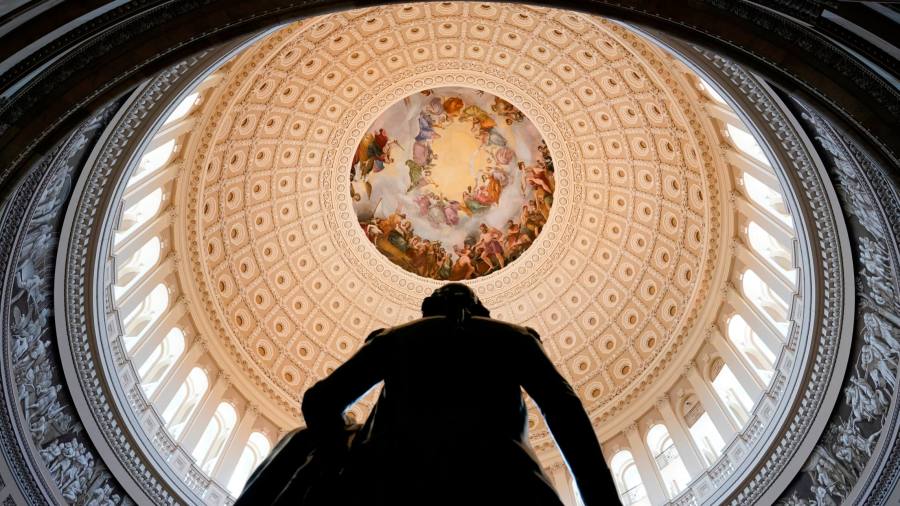Washington is braced for an intense week of wrangling to get the debt ceiling deal over the finish line after US lawmakers and the White House hammered out a last-minute agreement at the weekend to avoid a potential default within days.
The bill will be taken up by the House rules committee on Tuesday afternoon, which will determine the framework for considering the legislation. This could prove challenging given the panel includes several Republicans who may attempt to block it.
Its first big test is set to come with a vote in the House expected on Wednesday. Votes in the Senate will follow and could materialise at the weekend.
President Joe Biden was speaking with members of Congress on a daily basis ahead of the vote and was being updated several times a day on progress towards passing the bill, according to a White House official. On Monday, the president said he was feeling good about the bill’s prospects.
Lawmakers have little room for error. If legislation is not enacted by June 5, the US will run out of money to pay all its bills, which government agencies, regulators and Wall Street have warned would be a disaster for financial markets. The knock-on effects would shake the US and global economies, potentially plunging them into recession.
The bill increases the US’s $31.4tn debt ceiling for two years. Non-defence spending will remain flat in the 2024 fiscal year and may increase by only 1 per cent the following year. Biden’s defence budget request will remain unchanged.
Mark Zandi, chief economist at Moody’s Analytics, said the bill’s impact on the US economy would peak in late 2024, but would remain “manageable”. Zandi expected real gross domestic product to fall by 0.15 per cent and employment to decrease by 120,000 jobs. The unemployment rate would rise by approximately 0.1 percentage points, he predicted.
“There’s still some uncertainty over whether the bill will pass both houses at first attempt,” Paul Ashworth, chief North America economist at Capital Economics, wrote in a note. “But if it doesn’t, we suspect that a more alarmed reaction in financial markets will quickly focus minds in Congress and . . . it will pass shortly after that.” Ashworth expected the deal would not move any GDP forecasts by more than 0.1 per cent.
Michael Feroli, chief US economist at JPMorgan, estimated the agreement would cut federal spending in 2024 by approximately 0.2 per cent of GDP. That would be a smaller percentage than the reduction in spending in the fiscal year after the 2011 debt ceiling fight, which was equivalent to 0.7 per cent of GDP.
Republican leaders and the White House have been pushing to shore up backing from important mainstream lawmakers for the bipartisan pact since it was forged at the weekend.
The New Democrat Coalition, which represents nearly 100 Democrats, on Monday expressed its support in a statement: “Despite a divided government, President Biden has achieved a bipartisan agreement that will save our country from default until 2025 and protect our nation from economic collapse, while also preventing cuts to key programmes that millions of Americans rely upon.”
“Compromise depends on give and take and this bill required concessions from both sides,” the caucus added. “Defaulting on our debt, as some radical Republicans suggest we should, is not an option.”
Dusty Johnson, a House Republican from South Dakota, has also backed the bill. “There were no wins for Democrats,” he told CNN on Sunday. “There is nothing after the passage of this bill that will be more liberal or more progressive than it is today. It’s a remarkable conservative accomplishment.”
But the deal unleashed fierce pushback from the more conservative wing of the Republican party, predominantly from the far right Freedom Caucus, which includes allies of former president Donald Trump and lawmakers who earlier this year resisted the campaign by Kevin McCarthy to become the Republican House Speaker.
“This ‘deal’ is insanity,” Ralph Norman, a Republican from South Carolina and member of the Freedom Caucus, wrote on Twitter. “Not gonna vote to bankrupt our country. The American people deserve better.”
Lauren Boebert, a representative from Colorado and Trump loyalist, also opposed the pact. “As I’ve said since the draft agreement came out, this is NOT a win for the American people!” she wrote on Twitter.
Business groups have cheered the compromise reached and urged lawmakers to pass it quickly to avoid any economic calamity.
“As we have said from the beginning, defaulting on our debt would create economic chaos, harming manufacturing workers and their families and jeopardising our leadership in the world,” Jay Timmons, president of the National Association of Manufacturers, said in a statement on Monday.
Additional reporting by James Politi
Read the full article here




